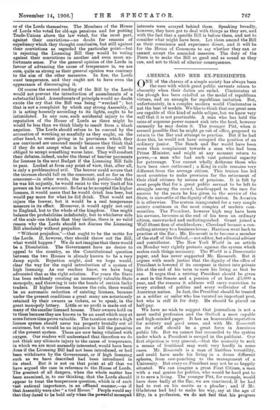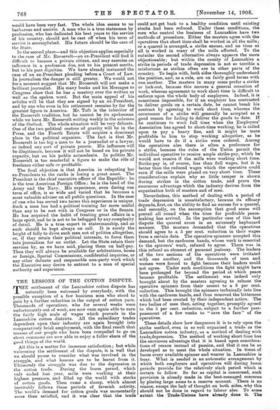AMERICA AND HER EX-PRESIDENTS.
ONE of the charms of a simple society has always been the ease with which great public servants return to obscurity when their duties are ended. Cincinnatus at the plough has been extolled as the model of republican virtues, and an example for republican imitation. But, unfortunately, in a complex modern world Cincinnatus is not the best of models. We like to think that our great men are capable of this kind of noble eclipse, but we know very well that it is not practicable. A man who has held the reins of supreme power cannot sink into the herd, however earnestly he may desire it. The younger Pitt, when it seemed possible that he might go out of office, proposed to return to the Bar and attempt to practise. But if he had done this, he would not have occupied the position of an ordinary junior. The Bench and Bar would have been more than complaisant towards a man who had been Prime Minister, and might at any moment return to power,—a man who had such vast potential capacity for patronage. You cannot wholly dethrone those who have been once enthroned ; a King in exile remains very different from the average citizen. This truism has led most countries to make provision for the retirement of their chief citizens by means of pensions. It is felt by most people that for a great public servant to be left to struggle among the crowd, handicapped in the race for success by the years he has given to the service of the State, is unworthy of the dignity of the nation. In America it is otherwise. The system inaugurated for a very simple society continues in the most complex of modern com- munities. The President, however high may have been his services, becomes at the end of his term an ordinary citizen, unrewarded and undistinguished. Grant joined a Wall Street firm of stockbrokers ; Cleveland became a con- sulting attorney to a business house ; Harrison went back to practise at the Bar ; Mr. Roosevelt is to become a member of the staff of the Outlook,—not editor, but editorial adviser and contributor. The New York World in an article on Monday very rightly protests against the system which makes such things necessary. The World is a Democratic paper, and has never supported Mr. Roosevelt. But it argues with much justice that the dignity of the office of President is lowered if its occupant is thrust into private life at the end of his term to earn his living as best he can. It urges that a. retiring President should be given a seat in the Senate and a pension of at least £5,000 a year, and the reasons it adduces will carry conviction to every student of politics and every wellwisher of the American nation. In fact, the President should be treated as a soldier or sailor who has vacated an important post, but who is still fit for duty. He should be placed on half-pay.
We have no wish to suggest that journalism is not a most useful profession and the Outlook a. most capable and high-minded paper. It has an honourable reputation for sobriety and good sense, and with Mr. Roosevelt on its staff should be a great force in American public life. But we cannot feel reconciled to the system under which a President is merged in the publicist. Our first objection is very general,—that the necessity to seek a means of livelihood may work very hardly in some cases. Mr. Roosevelt is a man of limitless versatility, and could have made his living in a dozen different spheres, from cow-punching to the management of a University. But every ex-President may not be so happily situated. We can imagine a great First Citizen, a man with a real genius for politics, who would be hard put to it to earn a living. The younger Pitt, for example, would have done badly at the Bar, we are convinced, if he had had to rest on his merits as a pleader ; and if Mr. Gladstone had had to make his way, say at the age of fifty, in a profession, we do not feel that his progress would have been very fast. The whole idea seems to us barbarous and uncivic. A man who is a true statesman by profession, who has dedicated his best years to the service of his country, should not be cast off when his term of service is accomplished. His future should be the care of the State.
In the second place—and this objection applies especially to the case of Mr. Roosevelt—an ex-President will find it difficult to become a private citizen, and may exercise an influence in a profession due, not to his present merits, but to his past dignities. We have already instanced the case of an ex-President pleading before a Court of Law. In journalism the danger is still greater. We would not for a moment suggest that Mr. Roosevelt will not make a brilliant journalist. His many books and his Messages to Congress show that he has a mastery over the written as well as the spoken word. But the main appeal of his articles will be that they are signed by an ex-President, and by one who even in his retirement remains by far the greatest figure in America. Mr. Taft is the inheritor of the Roosevelt tradition, but he cannot be its spokesman while we have Mr. Roosevelt writing weekly in the columns of the Outlook. The whole situation will be very delicate. One of the two political centres of gravity will be in the Press, and the Fourth Estate will acquire a dominant place in the political organism. The fact is that Mr. Roosevelt is too big a man to be a journalist or a lawyer, or indeed any sort of private person. His influence will be illegitimate, because it will not be based on his private capacity, but on his public antecedents. In politics Mr. Roosevelt is too masterful a figure to make the role of freelance either safe or profitable.
The final objection is that America in relegating her ex-Presidents to the ranks is losing a great asset. The President is the chief executive officer of the Republic : he is the true American Foreign Office : he is the head of the Army and the Navy. His experience, even during one term of office, is so wide and varied that he becomes a most valuable adviser on all public questions. In the case of one who has served two terms this experience is unique. Such a man has had a political training far more useful than any to be met with in Congress or in the Senate. He has acquired the habit of treating great affairs in a large spirit, and be is not to be befogged by any complexity of detail. He is a true expert in statesmanship, and as such should be kept always on call. It is surely the height of folly to drive such men out of politics altogether, or, if they retain their political interests, to force them into journalism for an outlet. Let the State retain their services by, as we have said, placing them on half-pay. Then they will always be available for arbitrations, home or foreign, Special Commissions, confidential inquiries, or any other delicate and responsible non-party work which time Executive may desire to entrust to a man of 'special authority and experience.











































 Previous page
Previous page